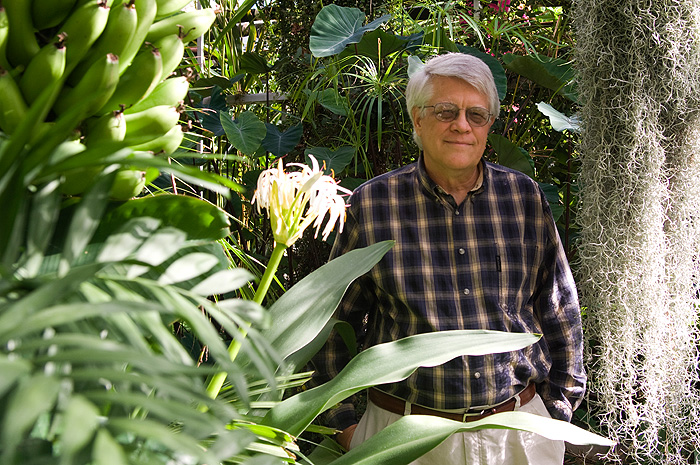
Robert K. Colwell, Board of Trustees Distinguished Professor of Ecology and Evolutionary Biology in the College of Liberal Arts and Sciences, is one of 212 new members elected to the American Academy of Arts and Sciences.
Among the new fellows of the Academy are winners of the Nobel, Pulitzer, and Pritzker prizes, the Academy Awards, and Golden Globes, and MacArthur and Guggenheim fellows.
The academy, founded in 1780 by John Adams and other scholar-patriots, recognizes accomplished “thinkers and doers” from each generation, including George Washington, Benjamin Franklin, and Albert Einstein.
Colwell is being recognized for his contributions to his field, tropical biology. In recent years, he has studied the potential effects of global warming on plant and animal species in Costa Rica, where he has conducted much of his field research.
In a 2008 article in Science magazine, he and his research team showed that tropical plants and animals are not immune to the effects of global warming, with tropical temperatures warming more than 1.4 degrees Fahrenheit since 1975. Species needing a cooler habitat will likely be driven to higher elevations, but because tropical forests from Mexico to Brazil vary little in temperature, latitude range shifts are unlikely, they found. Species that move up from the tropical lowlands into the mountains are unlikely to be replaced, the scientists wrote.
Working in the forests on the Barva volcano in Costa Rica, Colwell and his team collected data on the altitude ranges of nearly 2,000 species of plants and insects.
Some of that data was used in his study last year, while he was on sabbatical leave at the Center for Macroecology, Evolution, and Climate at the University of Copenhagen, modeling the distribution of species on mountainsides in the tropics for the past 800,000 years.
Using ice core climate record data and translating it to the last eight glacial cycles, Colwell and his collaborator, his former Ph.D. student Thiago Rangel (Ph.D. ’10, now an assistant professor at the Universidade Federal de Goiás in Brazil), are building computer models to analyze how repeated cold and hot cycles have affected species in the tropics.
They found that, as Colwell had predicted, tropical species in high elevations are threatened as temperatures rise and they have nowhere to go in warm interglacial periods, like the present time, but the same fate may have sent lowland tropical species to extinction during cold glacial periods. Those living halfway up the mountains survive better than those at the top or bottom elevations. They also found that happenstance has a significant role in which species survive.
“Chance events have long-lasting results when it comes to biogeography,” Colwell says.
Their paper on the work was presented by Colwell at the Royal Society in London in October, and published the same month in the Philosophical Transactions of the Royal Society. He and his wife, EEB Professor Robin Chazdon, who studies regrowth of the rain forests on former agricultural land in Costa Rica, both participated in a Royal Society working group conference last fall at the Royal Society Kavli Center in the UK.
Colwell has served as president of the American Society of Naturalists and vice president of the Ecological Society of America. He has won the Alumni Association’s award for Faculty Excellence in Research, and in 1998 he won the UConn Chancellor’s Information Technology Award for developing a database tracking thousands of rainforest species.
He earned his undergraduate degree at Harvard, and his Ph.D. – for which he first conducted fieldwork in Costa Rica – from the University of Michigan.
During fieldwork, he was once bitten by one of the world’s most poisonous snakes, the Fer-de-lance, and was evacuated for medical treatment.
His research has been funded by the National Science Foundation.
The Academy will induct its new fellows at a ceremony in October in Cambridge, Mass. Among the others awarded this year in the sciences, arts, public affairs, and humanities, are some well-known names: jazz icon Dave Brubeck; filmmaker Ken Burns; actors Daniel Day-Lewis and Helen Mirren; author and Nobel Prize winner Mario Vargas Llosa; singer-songwriter Paul Simon; and Nobel laureates Ei-Ichi Negish (chemistry) and H. David Politzer (physics).
To hear a podcast by Robert Colwell, click here.


